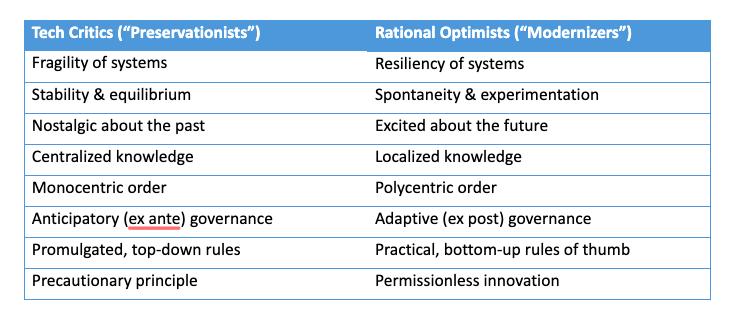How To Defend a Culture of Innovation During the Technopanic
Who will defend innovation in an age of technopanics and the so-called “techlash”? Fear and loathing of modern tech is rampant, and critics are turning up the pressure to throw more regulatory wrenches into the wheels of progress. Those of us who appreciate how technological innovation is the fundamental driver of improvements in human well-being must work harder to counter these threats.
In his book The Lever of Riches: Technological Creativity and Economic Progress, economic historian Joel Mokyr observed how technological progress is best viewed as “a fragile and vulnerable plant” that “is highly sensitive to the social and economic environment and can easily be arrested by relatively small external changes.” This is why it is essential to continuously nurture and defend a culture of innovation that encourages entrepreneurial enthusiasm and celebrates technological creativity.
The need for a vision
To that end, we need a vision and set of principles to fight back against neo-Luddites and their proposals to slow or stop technological change. “Permissionless innovation” and the “freedom to innovate” are two phrases that help ground our policy disposition. Unless tech critics can make a compelling case that a new technology will clearly create harm to society, innovators should be free to offer their new inventions to the world without having to ask for a permission slip first.
But we also need a phrase to describe our general disposition toward technological change and human progress more generally. Ten years ago, Matt Ridley gave us the best name for it that I have come across: “rational optimism.”
Tech critics are fond of portraying innovation supporters as Pollyannaish utopians who are guilty of excessive techno-boosterism. Indeed, some of those voices exist, and their rhetorical excesses are unfortunate because they make it easier for critics to paint all tech optimists as crackpots or anti-humanists. Ridley’s rational optimism serves as a better foundation because it is rooted in reason and empiricism, not gadget worship or far-flung transhumanist scenarios.
Rational optimism is, therefore, the vision and rallying cry we should use to support and defend a culture of innovation across the globe.
The rational-optimist creed
In my last book, as well as a forthcoming one, I sketched out what we might think of as the rational-optimist creed. Generally speaking, rational optimists
-
believe there is a symbiotic relationship between innovation, economic growth, pluralism, and human betterment, but also acknowledge the various challenges sometimes associated with technological change;
-
look forward to a better future and reject overly nostalgic accounts of some supposed “good ‘ol days” or bygone better eras;
-
base our optimism on facts and historical analysis, not on blind faith in any particular viewpoint, ideology, or gut feeling;
-
support practical, bottom-up solutions to hard problems through ongoing trial-and-error experimentation, but are not wedded to any one process to get the job done;
-
appreciate entrepreneurs for their willingness to take risks and try new things, but do not engage in hero worship of any particular individual, organization, or particular technology.
In addition to Ridley and Mokyr, many other scholars have written important books that develop the rational-optimist vision and identify the connection between technological innovation and human flourishing. Some of the best include Steven Pinker (Enlightenment Now), Deirdre McCloskey (Bourgeois Equality), Calestous Juma (Innovation and Its Enemies), Samuel Florman (The Existential Pleasures of Engineering), and Virginia Postrel (The Future and Its Enemies).
Trial and error is the basis of wisdom
These scholars offer us a pro-growth, pro-progress, pro-freedom vision of cultural and economic change, but they also reject techno-utopianism. In fact, rational optimists are anti-utopians because they understand that hard problems can only be solved through trial and error.
As Postrel argued in The Future and Its Enemies, no one is divinely inspired to come up with “The One Best Way” of doing things right out of the gate. Rational optimists teach us that ongoing experimentation is the key to unlocking knowledge and increasing prosperity — for individuals, organizations, nations, and entire civilizations. Wisdom and progress are a function of our willingness to tolerate and learn from our failures.
Writing in 1960, Nobel Prize-winning economist F.A. Hayek wisely observed that while many intellectuals defend the freedom to speak, they “ignore the importance of the freedom of doing things.” “Freedom of action, even in humble things, is as important as freedom of thought,” he noted. Indeed, the two are inextricably linked. In this sense, learning by doing would more accurately be called learning by failing. Wisdom is not designed but is instead slowly discovered through this inherently messy process.
Trade-offs vs. solutions
Alas, tech critics tend to disparage this learning process or draw the wrong lessons from it. To the extent critics are interested in entrepreneurialism, experimentation, and the occasional failures that they entail, it is often only to snobbishly deride that process, or to suggest that every failure is an example of why we can’t trust that process at all. “Trial and error,” Florman noted in 1976, “is exactly what the antitechnologists cannot abide.”
Rational optimists understand that technological change involves some downsides, but our response is not to freeze civilization in place in the face of adversity. Stasis is never the answer. “The real danger comes from slowing down change,” Ridley notes. Instead, rational optimists want trial and error to continue so that we can quickly learn from those experiments and figure out new and better ways of getting things done for the betterment of humanity.
Critics will insist that we need solutions and that they can provide them with the right application of technological forecasting and well-intentioned controls. Ultimately, though, as Thomas Sowell aptly noted in his book A Conflict of Visions, “there are no solutions. There are only trade-offs.”
This fundamental insight drives rational optimists to reject the vision of innovation critics, which imagines every hiccup as a catastrophe to be addressed through sweeping top-down, centralized, anticipatory rules that reorder things according to some grand regulatory schema. By contrast, rational optimists embrace spontaneity, adaptation, and resiliency in the face of uncertainty. We appreciate how humans roll with the punches, adapt, and muddle through — usually by creating new and better technologies to solve problems.
Preservationists vs. modernizers
Another useful way of thinking about these opposing perspectives on innovation and the future comes from Robert D. Atkinson, founder and president of the Information Technology and Innovation Foundation. His 2005 book, The Past and Future of America’s Economy, identified the way “a political divide is emerging between preservationists who want to hold onto the past and modernizers who recognize that new times require new means.”
This “preservationist”-versus-“modernizer” tension can be seen in almost every policy squabble today. Preservationist-minded tech critics and policy makers favor the precautionary principle as the default in almost every emerging tech sector. Modernizers who are rationally optimistic about the future believe that innovation should be given the benefit of the doubt and treated as innocent until proven guilty.
The adjoining table identifies the way this conflict of visions plays out over a host of variables.
“The biggest risk that society faces by adopting approaches that suppress innovation,” Calestous Juma concluded, “is that they amplify the activities of those who want to preserve the status quo by silencing those arguing for a more open future.” The openness of which Juma spoke represents tolerance of new ideas, inventions, and unknown futures.
Rational optimists favor embracing an open future and ongoing innovation to figure out what works best. Learning from our experiences and failures will ultimately help us develop new and better technologies that will allow us all to live wealthier, healthier, safer, and longer lives.














